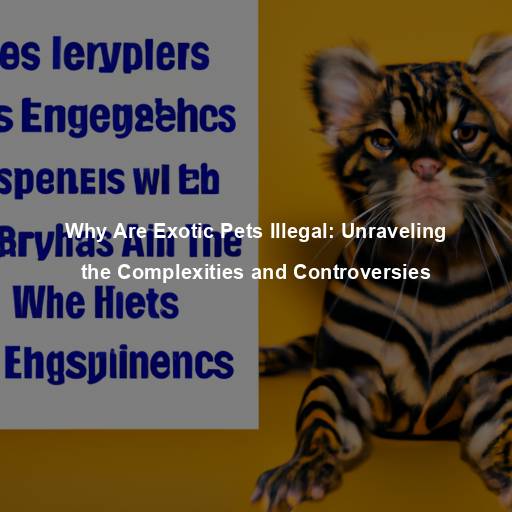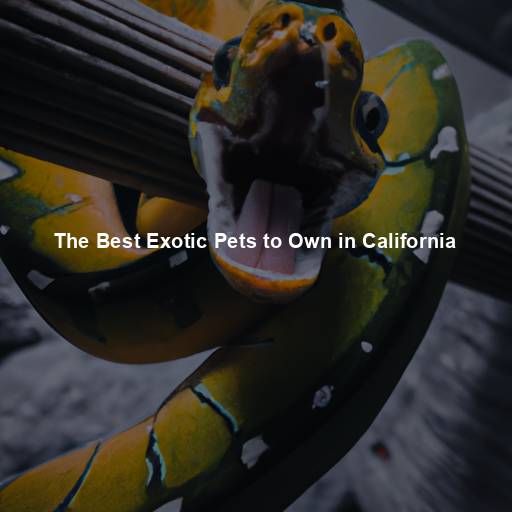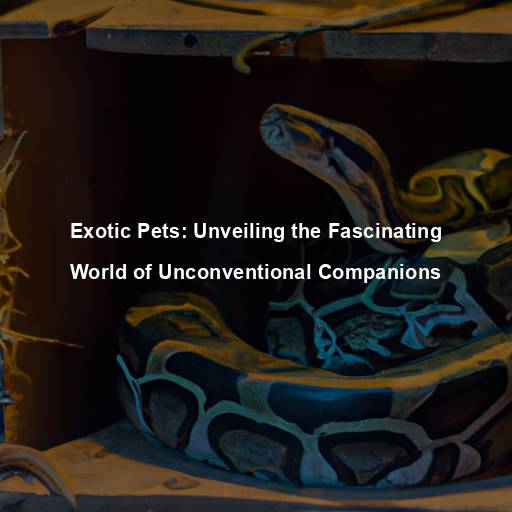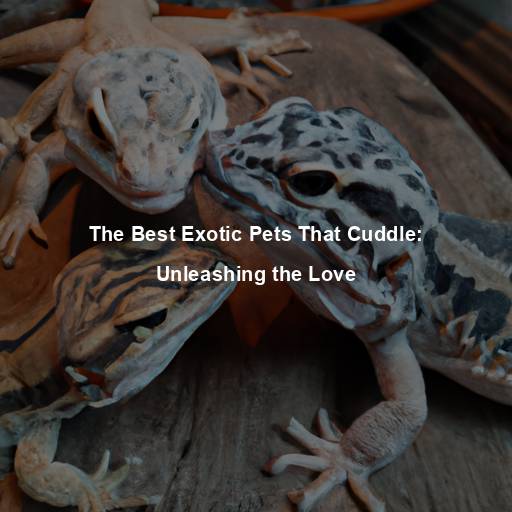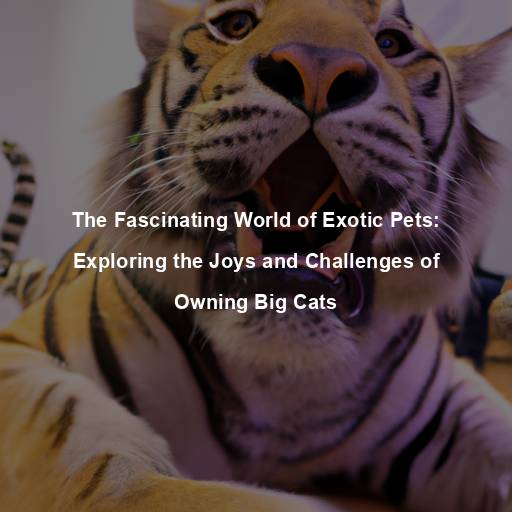Why Are Exotic Pets Illegal: Unraveling the Complexities and Controversies
Last Updated on October 25, 2023 by Evan
Contents
- 1 The Fascination with Exotic Pets: A Double-Edged Sword
- 2 The Environmental Impact: A Delicate Ecosystem at Stake
- 3 Animal Welfare: The Price Paid for Human Fascination
- 4 Public Safety: Balancing Human Interests with Potential Risks
- 5 Conservation and Preservation: A Call to Protect Biodiversity
- 6 The Legal Landscape: A Patchwork of Regulations and Bans
- 7 The Role of Education and Advocacy: Promoting Responsible Pet Ownership
- 8 The Complexities of Exotic Pet Ownership: A Multifaceted Issue
- 9 FAQs: Why Are Exotic Pets Illegal?
The Fascination with Exotic Pets: A Double-Edged Sword
For countless years, humans have been fascinated by the allure of exotic pets. These unconventional creatures hold a certain mystique that taps into our yearning for something extraordinary. Whether it be the vibrant colors of tropical birds, the graceful slither of reptiles, or the regal presence of big cats, the world of exotic pets is like a glimpse into a fantastical realm. However, beneath this enchantment lies a whirlwind of complexities and controversies, leading to the prohibition of owning these creatures in various jurisdictions.
The Environmental Impact: A Delicate Ecosystem at Stake
One of the primary concerns surrounding exotic pets is their potential impact on the environment. Many exotic species are not native to the regions where they are kept as pets, making them a potential threat to local ecosystems. If these animals were to escape or be released into the wild, they could disrupt delicate ecological balances, outcompete native species, and even cause the extinction of local flora and fauna. The introduction of non-native species has already caused significant harm in various parts of the world, highlighting the importance of preventing the spread of exotic pets.
The Pythons of the Everglades: A Cautionary Tale
The captivating tale of the Burmese pythons in the Florida Everglades carves a perplexing path through the annals of exotic pet conundrums. Once cherished as household companions, these colossal serpents have metamorphosed into formidable adversaries for the native wildlife populations. Nature’s dance is thrown askew as the pythons propagate with abandon, their numbers reaching unprecedented levels, untouched by any form of natural check. This disconcerting revelation raises the swirling question of whether stringent regulations on the realm of exotic pet ownership should be brought forth to restore equilibrium to this fragile ecosystem.
Animal Welfare: The Price Paid for Human Fascination
While the allure of exotic pets may be undeniable, the welfare of these animals often suffers in captivity. Many exotic species have intricate physical, social, and environmental needs that are challenging, if not impossible, to meet in a domestic setting. These creatures are often subjected to cramped enclosures, improper diets, and inadequate mental stimulation, leading to stress, behavioral issues, and ultimately, compromised well-being. Considering the ethical implications of confining these animals solely for human pleasure, lawmakers have implemented legal measures to protect the welfare of exotic species.
The Sad Reality of the Exotic Pet Trade
Immersed within the enigmatic world of the exotic pet trade lies a disconcerting tale that challenges our understanding of compassion and responsibility. A journey fraught with perplexing questions, as innocent creatures are ripped from their natural homes, severed from their unsuspecting families, and thrust into a whirlwind of harrowing travels in a desperate bid to meet the insatiable desires of eager buyers. The veil is lifted to reveal a heart-wrenching reality, where these resilient beings endure cramped and squalid conditions, stripped of adequate sustenance and hydration. Alas, countless lives succumb to the treacherous course of transportation, while those who persevere find themselves thrust into a disconcerting limbo, their fate teetering on the edge of an uncertain captivity.
Public Safety: Balancing Human Interests with Potential Risks
The safety of the public is an essential factor when discussing the forbiddance of exotic pets. Although not all exotic animals pose a direct danger to humans, some species possess the capability to cause harm or even death. The untamed instincts, erratic behavior, and sheer physical power of certain exotic beings can transform them into hazardous companions. Instances of attacks on people, escapees inciting public hysteria, and the transmission of zoonotic illnesses have propelled valid anxieties regarding the perils linked to owning exotic pets.
The Tragedy of Private Menageries
In a world filled with awe-inspiring creatures, the allure of owning an exotic pet can be undeniably captivating. However, recent headlines have laid bare the somber truth behind these seemingly enchanting relationships. From heart-wrenching accounts of owners maimed by their own chimps to heart-stopping tales of majestic big cats prowling through unsuspecting neighborhoods, the dangers lurking in the shadows of domestic settings have become impossible to ignore. It is in these apparent tragedies that we find ourselves pondering the paradoxical nature of our desires – our innate need to be close to nature conflicting with the perilous consequences that can ensue.
Conservation and Preservation: A Call to Protect Biodiversity
In addition to the numerous ethical and safety concerns associated with the keeping of exotic pets, there is a much larger issue at stake: the preservation of our planet’s biodiversity. Countless exotic species are already under immense pressure in their native environments due to factors like deforestation, climate change, and illegal hunting. Allowing these creatures to be kept as pets only exacerbates the threats they face, undermining the critical conservation efforts aimed at protecting their species. By enforcing bans on exotic pet ownership, authorities are making a statement about the importance of prioritizing the preservation of these animals in their natural habitats, where they play crucial roles in maintaining the delicate balance of our ecosystem.
Sanctuaries: A Solution for the Unfortunate Victims
Although some may perceive the prohibition of owning exotic pets as a strict measure, it is necessary to consider alternative solutions that prioritize the well-being and protection of these animals. Sanctuaries and rescue centers play a vital role in providing a safe haven for exotic animals that have been confiscated or voluntarily surrendered. This approach focuses on rehabilitating and providing proper care for these animals, allowing them to live in an environment that caters to their physical and behavioral needs. By endorsing and raising awareness about these sanctuaries, we can compassionately address the welfare of exotic species while also safeguarding our ecosystems.
Cultural Symbolism: Status and Prestige
There has always been an undeniable allure surrounding the idea of owning an exotic pet. Dating back to the time of kings and queens, the elite class flaunted their opulence through their remarkable collections of exotic creatures. These extraordinary displays of power not only showcased their luxurious lifestyles but also underscored their ability to obtain and care for these unconventional animals. With the passage of time, this fascination with rare pets has prevailed, persisting in the modern age where exotic pet ownership has become synonymous with affluence and individuality.
Media Influence: Glamorizing the Exotic
In today’s interconnected world, media plays a significant role in shaping popular culture and influencing public opinion. Movies, TV shows, and social media platforms often depict exotic pets in a glamorous and desirable light. Characters like Tony Montana’s tiger in “Scarface” or celebrities flaunting their pet monkeys on Instagram contribute to the perception that owning exotic pets is a glamorous and exciting endeavor. However, it is important to distinguish between the romanticized portrayal and the reality of caring for these animals responsibly.
The Legal Landscape: A Patchwork of Regulations and Bans
Owning exotic pets can be a wild journey, tangled in a web of legal nuances that vary dramatically across jurisdictions. It’s a jigsaw puzzle of regulations, each piece adding a layer of complexity and perplexity. In some places, the law boldly bars ownership of certain exotic species, while in others, it tiptoes cautiously with stringent licensing requirements or exclusive ownership rights bestowed to educational or conservation establishments. This intricate legal tapestry mirrors the intricate dance between public safety, animal welfare, and individual liberties.
Legislative Considerations: Protecting Humans and Animals
Legislators face the challenging task of striking a balance between protecting public safety and respecting individual freedoms. The decision to ban or regulate exotic pet ownership is often driven by concerns over potential risks to humans, both in terms of physical harm and the spread of diseases. Furthermore, the welfare of the animals themselves is a significant consideration, as legislators aim to prevent the suffering and mistreatment of these creatures. Crafting effective legislation requires a thorough understanding of the specific challenges and nuances associated with each species.
Despite regulations and bans, the underground market for exotic pets continues to thrive. The allure of owning an illegal or restricted animal often drives individuals to seek out unscrupulous sellers who are willing to circumvent the law. This black market poses significant challenges for law enforcement agencies, as it operates covertly and often across international borders. Efforts to combat illegal trade require collaboration between governments, wildlife organizations, and law enforcement agencies to target the source of the problem and dismantle smuggling networks.
The Role of Education and Advocacy: Promoting Responsible Pet Ownership
Education and advocacy play a vital role in shaping public perception and behavior towards exotic pets. By raising awareness about the ethical and practical considerations associated with owning these animals, organizations and individuals can promote responsible pet ownership and conservation efforts.
Public Awareness Campaigns: Shifting Perspectives
As we delve into the intricate world of pet ownership, it becomes apparent that a transformation in societal thinking is urgently needed. Public awareness campaigns stand as beacons of hope, shedding light on the cascade of consequences that follow the allure of exotic pets. By unveiling the hidden perils to both humans and animals alike, while unraveling the intricate web of environmental impact, these campaigns aim to unveil the truth behind the guise of glamour that shrouds these extraordinary creatures. This pivotal shift in perception will hopefully ignite a spark of contemplation, urging individuals to explore alternative avenues of admiration for these awe-inspiring beings.
Support for Conservation Initiatives: Preserving Species in the Wild
In a world where exotic pets often captivate our imaginations, it’s time to redirect that fascination towards a greater cause – preserving endangered species. By shifting our focus towards supporting conservation initiatives, we can truly make a difference in their long-term survival. From investing resources in protecting their natural habitats to combating the illegal wildlife trade, there are numerous ways we can contribute to the perplexing puzzle of species preservation. So let’s channel our attention towards these efforts and help ensure that these captivating creatures continue to thrive in their rightful homes.
The Complexities of Exotic Pet Ownership: A Multifaceted Issue
Delving into the perplexing realm of the forbidden kingdom, it becomes evident that the ban on exotic pets is not a decision made lightly. This tumultuous topic crawls through a dense jungle of ecological consequences, animal welfare woes, and the precarious balance between humanity’s safety and the desire for conservation. To tread the treacherous path of understanding, one must embrace a holistic perspective that embraces the preservation of biodiversity, champions the rights of our furry and feathered friends, and safeguards the well-being of our society at large. Only through such a delicate dance can we forge a future where both humans and these exotic wonders coexist in harmony.
Encouraging Responsible Ownership: A Call to Action
As individuals, we have the power to make a difference by educating ourselves and others about the complexities and responsibilities associated with exotic pet ownership. By supporting legislation that protects both humans and animals, advocating for stricter enforcement of existing laws, and promoting alternatives such as supporting sanctuaries and conservation initiatives, we can contribute to a more compassionate and sustainable relationship with these extraordinary creatures. Let us strive for a future where our fascination with exotic pets is tempered by a deep respect for the natural world and a commitment to its preservation.
FAQs: Why Are Exotic Pets Illegal?
What are exotic pets?
Exotic pets refer to non-domesticated animals that are not commonly kept as household pets. These can include animals such as tigers, monkeys, reptiles, large birds, and various species of wild animals.
Why are exotic pets illegal?
The allure of exotic pets can be quite beguiling, but it’s crucial to understand the intricate reasons behind the regulations and prohibitions surrounding them. These captivating creatures often possess unique dietary and environmental requirements that can confound even the most well-intentioned pet owner. As we covet these extraordinary inhabitants, let us not forget the potential toll their captivity can take on their overall health and welfare, as they struggle to adapt to alien surroundings, facing stress, malnourishment, and the looming threat of disease. Furthermore, the dangers of releasing or having these animals escape into the wild cannot be ignored, as they possess the capability to unsettle and derail local ecosystems. Thus, we must acknowledge that safeguarding these vibrant beings and preserving the delicate balance of our environment requires restricting the ownership of certain exotic pets.
It’s no secret that owning exotic pets can present legal complications. Given their wild nature, these untamed creatures can be quite a handful, posing a potential threat to public safety. The mere unpredictability of exotic animals opens the door to a myriad of concerns, from endangering their owners and others to wreaking havoc on their surroundings. Alarming instances of attacks and unfortunate accidents resulting in severe injuries or even fatalities have underscored the need for regulatory measures. Consequently, governmental authorities frequently resort to implementing strict legal restrictions or outright bans on the ownership of specific exotic species.
Do some people still keep exotic pets illegally?
Unfortunately, yes. Despite the laws and regulations in place, there are instances where people illegally acquire and keep exotic pets. This can occur through illegal trade, smuggling, or keeping animals without the required permits and licenses. However, it is crucial to understand that keeping exotic animals without proper knowledge and expertise could have severe consequences for both the animal and the owner. It is always recommended to support and adhere to the legal framework in place to protect the welfare of animals and promote public safety.
Can owning an exotic pet be harmful to the animal?
Owning a unique and extraordinary creature as a pet can seem like an exciting adventure. However, beneath the surface of our fascination lies a perplexing truth. These magnificent animals often come with complex and demanding requirements that may leave even the most well-intentioned owners feeling overwhelmed. With their particular needs for sprawling habitats, specialized diets, and social connections with their own kind, the task of adequately caring for them becomes a burst of challenges. By placing restrictions on ownership, we strive to protect these incredible creatures from the uncertainties of subpar care and unsuitable living conditions, ultimately ensuring their welfare remains intact.

